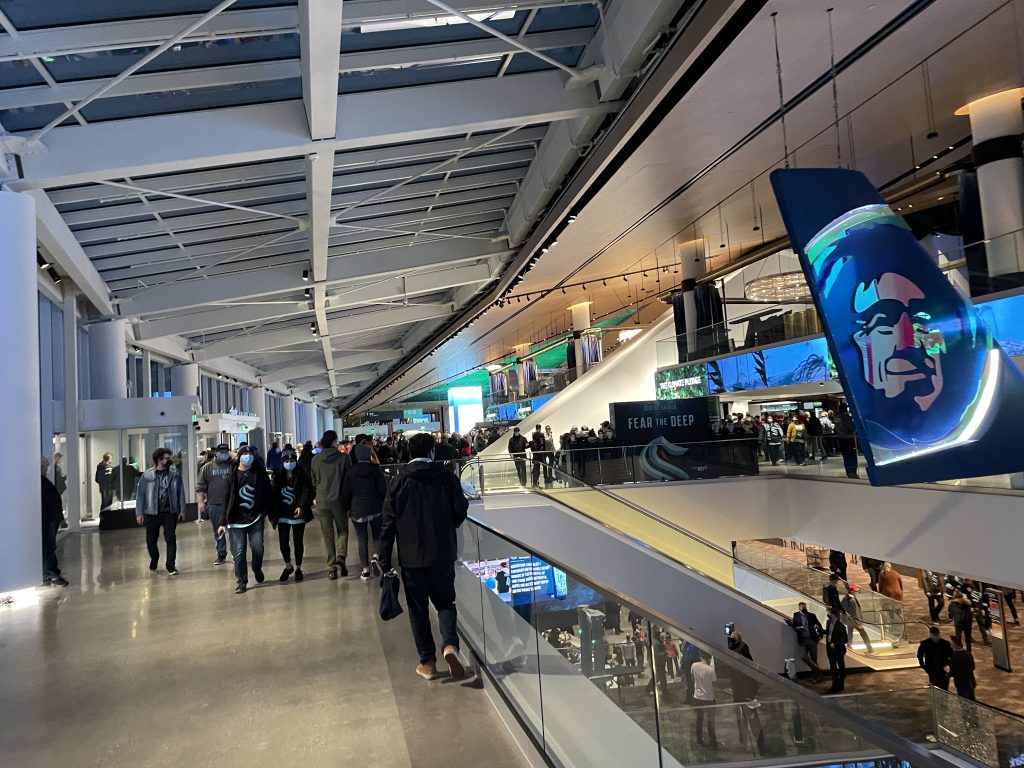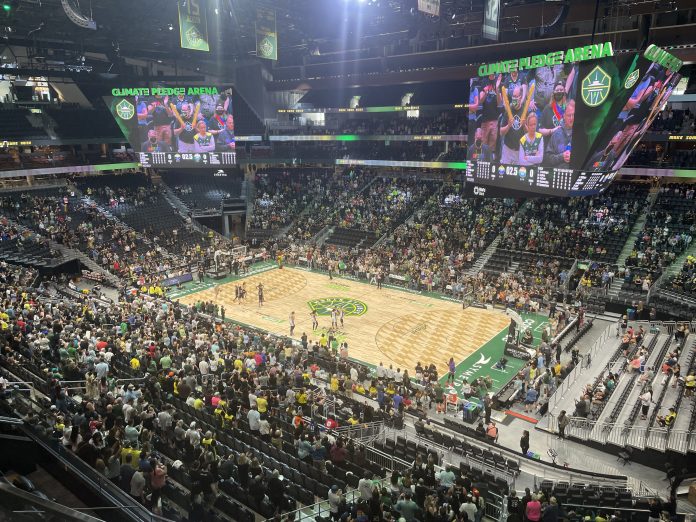
It’s 4th of July weekend, so we’re in the doldrums of the sports year. WNBA, soccer, and baseball are in the long stretch of their seasons, while hockey, NFL, and college sports are in their off seasons. So it’s time to look at the sports year that was, how it impacted the city, and get a glimpse ahead at the coming months and years.
Entries – a new home in Queen Anne
The headline for the last year was the new green neon on Seattle’s skyline. In October, Climate Pledge Arena opened its doors and welcomed thousands of fans to the inaugural season of Seattle Kraken hockey. By spring, the arena had hosted a number of concerts, all meeting with critical success. And the return of the Seattle Storm to Downtown after the arena construction sent them to Everett for a few years has confirmed one thing: Climate Pledge Arena looks great outfitted for basketball.
The building is a success. Developed by Oak View Group through a Memorandum of Understanding with the City of Seattle, the new 17,000 seat facility was built in four years over the pandemic. Preserving the historic roof from the 1962 World’s Fair, the site was excavated and a completely new building constructed to meet the old. Naming rights from Amazon’s environmental initiative pushed the structure to be the first events center trying to achieve net-zero carbon certification.
The results are spectacular. As we covered in our review of the building when it opened, the place is beautiful. The old arena had a horseshoe seating bowl, and the renovation completed the loop of seats by adding an airy atrium on the south side. New concessions serving the suites are located on the long stretches of the lower level. There’s a lot of concrete, but it doesn’t feel like an icebox. The green features, including plantings and wood, make the building comfortable.
Of course, there are two sides to the opening of the new arena: the building and the performances. Unfortunately, the city’s newest sports franchise didn’t have quite the expected number of wins during its inaugural season. The Kraken ended the season with 60 points coming from 27 wins, 49 losses, and 6 over time losses. This put them in last place in the Pacific division. But that was still ahead of last place teams in two of the other three divisions!
There were plenty of highlights to take away from the Kraken season, including a lot of firsts. But the gaudy first year success of the last expansion team — the Las Vegas Golden Knights made it to the Stanley Cup finals their first year — set the bar extremely high. What was not taken into account for the Kraken was a pre-season still tweaked by pandemic rules, weeks off for Covid and the Olympic Games (which ended up being Covid recovery), and 31 other teams that were not going to let another expansion team run on them again.
Two of our four critical notes of Climate Pledge Arena in October have been improved since publication of the review article. First, the entry works much better, mostly with the waiver of vaccine cards, and it’s down to standard venue entry queue wait times. Stanchions have also been put up at the bathrooms, so lines move quicker and more obviously from a single direction. Experience shows that the bathrooms clear in plenty of time during intermissions.
However, waits and selection at concessions continue to be hit-or-miss. A recent Storm game saw many empty food stands, including all of the Impossible stands, which limited vegetarian options to nachos and pretzels. There was also comment that staffing issues have contributed to the lack of options, but there would be a lot more forgiveness if beers weren’t $16.
The other very critical note still stands: 1st Avenue continues to be a godforsaken mess. Enforce the bus lanes, people.
Exits – Wilson, Seager, Bird, and Montlake?
Following the disappointing 2021 campaign, the Seahawks said goodbye to championship quarterback Russell Wilson. He was the right man for the city at the time, and Seattle may take his exit a little more personally than our stoic personality can express. We’ll see how things go when Russ and the Denver Broncos show up for the home opener on September 12.
Mariners baseball saw its own exit with the retirement of veteran Kyle Seager. The team’s 11 season third baseman was not expected to return as the M’s were looking towards a younger core of starters, but his quiet retirement in December was a contrast to the loud standing ovation he received in the last game of the year.
The 2021 baseball season was an exciting one, with the team coming close to its first playoff spot in 20 years. But the Mariners still did not receive the help they needed to slip into a wild card spot. At mid-season in 2022, hopes are not high. A couple of lackluster series including a fracas against the Angels as well as the slow start for new ace pitcher Robbie Ray doesn’t look good for the M’s. The Mariners hold the longest current post season drought in all of baseball as well as a 45 year drought on appearing in the World Series. Coincidentally, 45 is the age of the team.
Now, at mid summer, Seattle Storm fans are preparing their own farewell tour for the most decorated of Seattle sports legends: Sue Bird has announced this will be her final season. Her four championships for the city put her alone ahead of the city’s other current sports franchises. Combined.
One more exit: amateur student athletes. College sports is undergoing dual tectonic shifts. First, the biggest money making sports – men’s football and basketball – are pushing a consolidation of athletic conferences. Just this week, reports arose that University of Southern California and UCLA will be leaving the Pac-12 conference for the increasingly misnamed Big Ten. That leaves UW and WSU with eight other western schools splitting one of the country’s smallest television rights deals.
The second change is the introduction of Name, Image, and Likeness (NIL) money. Whereas student athletes used to disqualify themselves by accepting any sort of benefit, much less direct cash from boosters, court rulings have tossed all that out the window. Now student athletes can take direct cash for autographs, endorsements, and personal appearances. UW has an entire office devoted to this called Boundless Futures. What will be interesting is whether the region’s top name employers begin putting money into student athletes’ pockets. Or will those endorsements be left to small, local businesses? It could be a determining factor in attracting talent to UW’s athletics and really the entire shape of college sports in the future.
Expectations — you get a new building!
Looking ahead, it’s been announced that Seattle will host two significant sporting events over the next few years. In 2023, Seattle will host the MLB All Star Game. This is a week of festivities in the middle of summer that includes Home Run Derby and celebrity softball.
Seattle will also host matches for the 2026 Men’s FIFA World Cup. As the biggest sporting event in the world, it’s impossible to overstate the level of viewership that this will put on the city. To meet FIFA requirements as a host venue, Lumen Field will see upgrades to video boards, WiFi, and concessions, and the current artificial turf will be replaced with natural grass for the event. While the selection was somewhat expected, it is a nod to the record 68,741 people who attended the Sounders CONCACAF (Confederation of North, Central America, and Caribbean Association Football) Championship in May.
These events will bring thousands of fans into town and put the spotlight on Seattle. That has raised concerns about whether the city’s population experiencing homelessness will be swept and hidden. Sporting events often see cities shove their vulnerable populations to the side in an effort to present a pretty face to the world.
Seattle’s sports are also about to see a mini-building boom as the Sounders and Storm begin work on their new training complexes. The Sounders’ new training facility will be on Renton’s Longacres site. It will be constructed by Unico Properties as part of a 158 acre redevelopment of the former Boeing property. The completed project will include the practice facility and 3,000 apartments in addition to the 900,000 square feet of office space already there. The site is adjacent to the Tukwila Sounder train station.
After some controversy over land use exceptions, the Storm will see their new facility go up on team land in Interbay near Dravus Street. Proposed at 50,000 square feet, the new facility was larger than normally allowed for athletic uses in industrial zones. With some lobbying by the players and then Mayor Jenny Durkan, the City Council approved the exception last October. Land use applications are underway. With the Kraken’s complex in Northgate and light rail eventually connecting through Interbay, almost all of Seattle’s franchises will one day have training sites accessible by rapid transit.
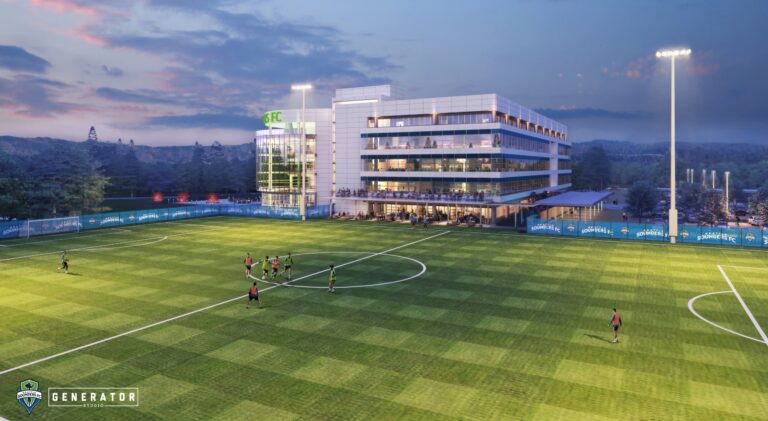
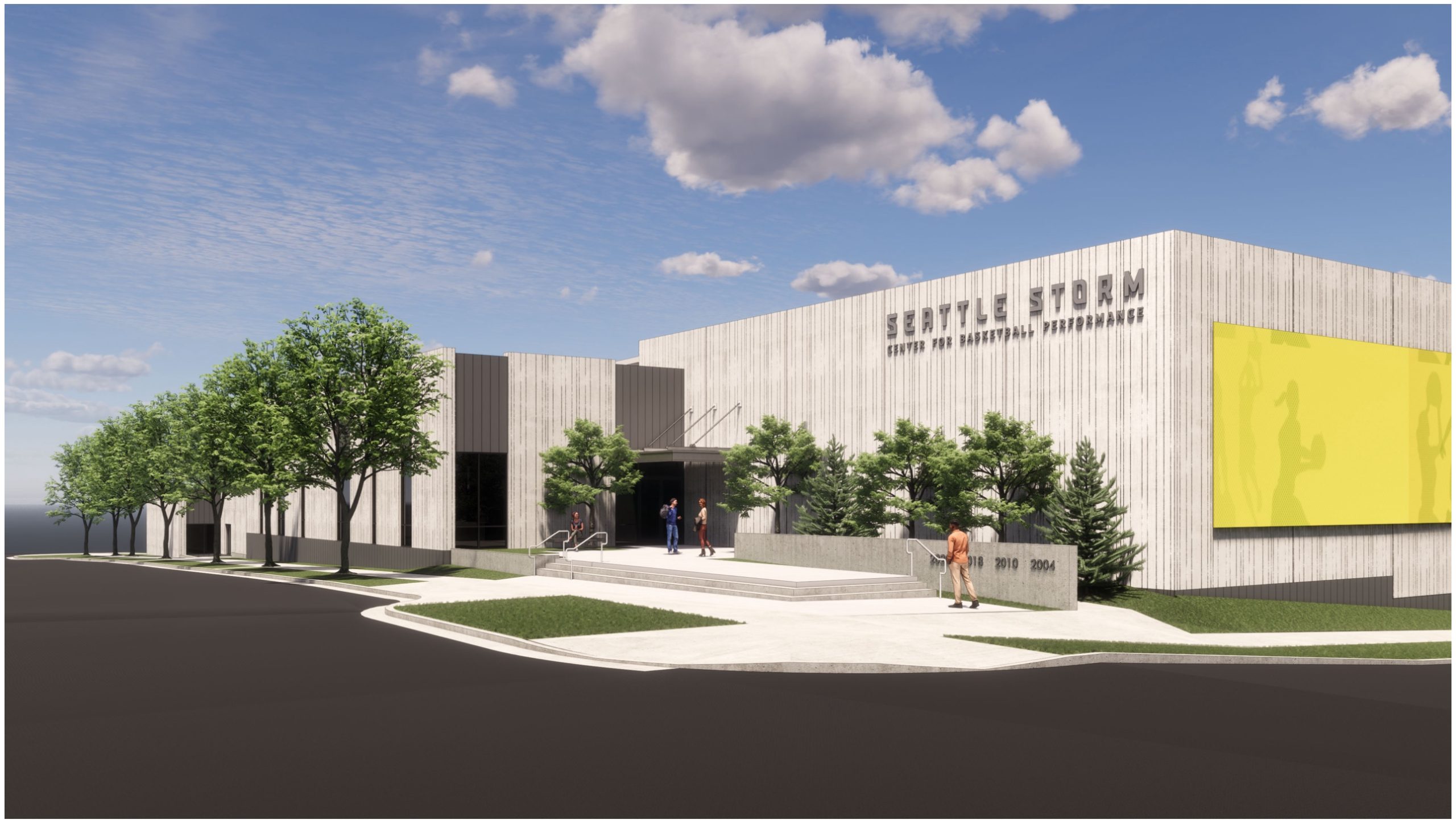
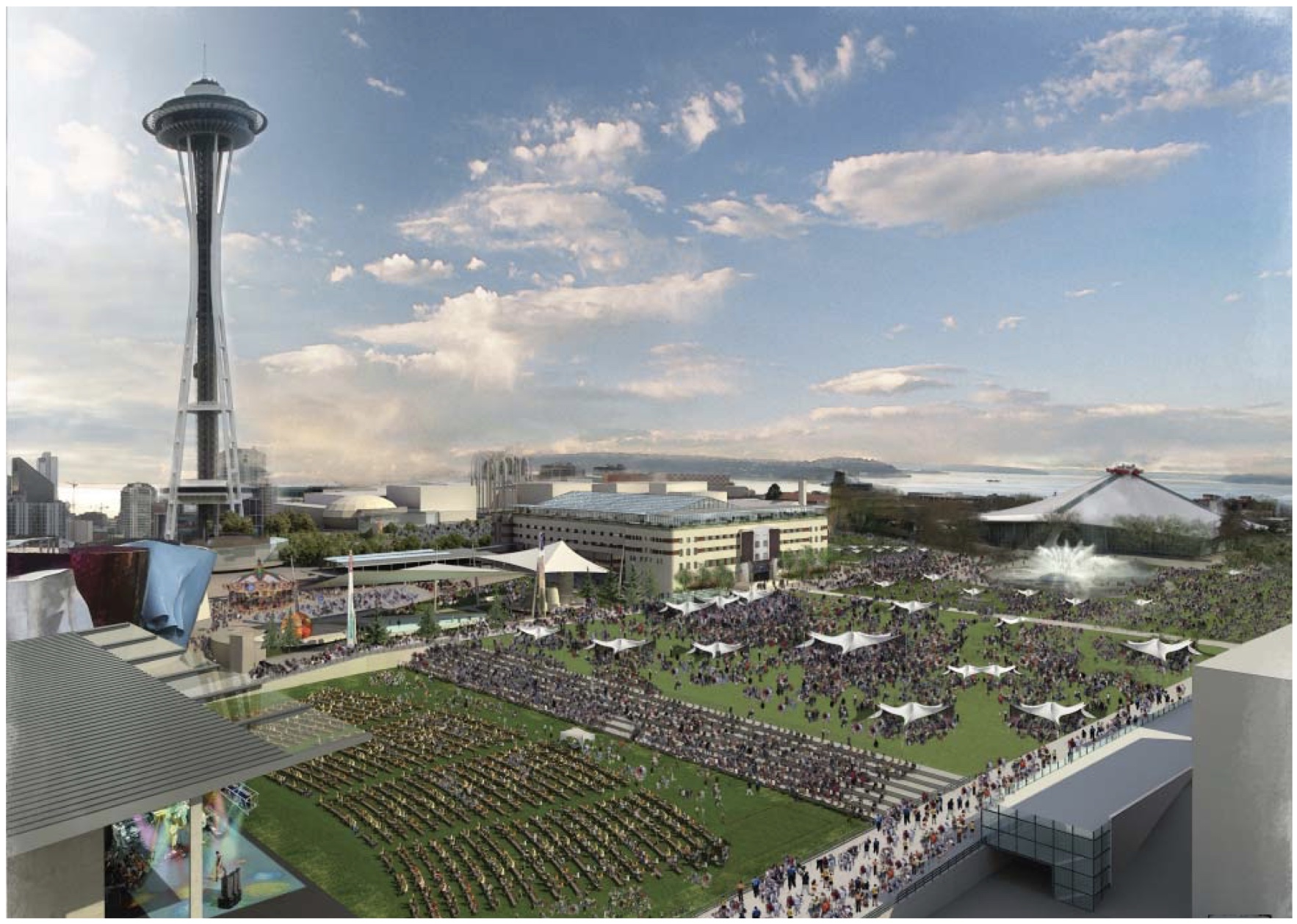
Development of sports venues at Seattle Center is not yet done either. In October, a letter of intent was signed between then Mayor Jenny Durkan and Seattle Schools Superintendent Brent Jones identifying a site for a Downtown school and creating a pathway for replacing Memorial Stadium. The 75 year old stadium hosts high school athletic events and graduations as well as concerts during festivals in Seattle Center. In February, city voters approved the school district’s bond levy, which included $66.5 million for the stadium renovation. Of particular interest for many is the preservation of the stadium’s memorial wall that lists the names of 800 Seattle School District alumni who died in World War II.
Construction of one regional athletic venue did fall through this year, however. The pandemic quashed development of a soccer-specific stadium in Tacoma. The facility was to be a public/private partnership between the Sounders, the Tacoma Rainiers, and the City of Tacoma. OL Reign, the region’s NWSL franchise, tried to restart the project with a feasibility study. However, that report showed the new facility would not actually be feasible. OL Reign, who had been playing home games in Tacoma’s Cheney Stadium, have returned to playing home matches in Seattle. Last season’s Seattle/Portland doubleheader with Sounders and OL Reign playing back to back matches against the Timbers and Thorns showed that Lumen Field is a worthy home for the region’s soccer.
And no responsible future-looking Seattle sports article can get by without a mention of the return of the Sonics. The NBA is returning to the city with an announced pre-season game between the Portland Trailblazers and the Los Angeles Clippers at Climate Pledge Arena on October 3. Also, noise arose this spring that the NBA would be accepting two new teams in Seattle and Las Vegas when its current media rights contract ends in 2024. This has been categorically denied, but the pieces are falling into place. Oak View Group is developing a 20,000 seat arena off the Vegas Strip, and the eye watering $2.5 billion expansion fee for each new team may be too lucrative for the other 30 owners to turn down. It would be nice to skip Vegas and replace the NBA team in Vancouver so we can expand the Cascadia Cup to basketball. But perhaps that will come in the future.
So the question does not appear to be if, but when the Seattle Sonics return. But what’s also dropped off is discussion of the team playing anywhere except Climate Pledge Arena. With that, so goes Chris Hansen’s plans for a SoDo sports facility. However, the holding organization for his SoDo properties — WSA Properties LLC — still has a dozen parcels in the area totaling close to 410,000 square feet of land. The development of those properties will be fascinating, even if they don’t become a sports venue.
Ray Dubicki is a stay-at-home dad and parent-on-call for taking care of general school and neighborhood tasks around Ballard. This lets him see how urbanism works (or doesn’t) during the hours most people are locked in their office. He is an attorney and urbanist by training, with soup-to-nuts planning experience from code enforcement to university development to writing zoning ordinances. He enjoys using PowerPoint, but only because it’s no longer a weekly obligation.


